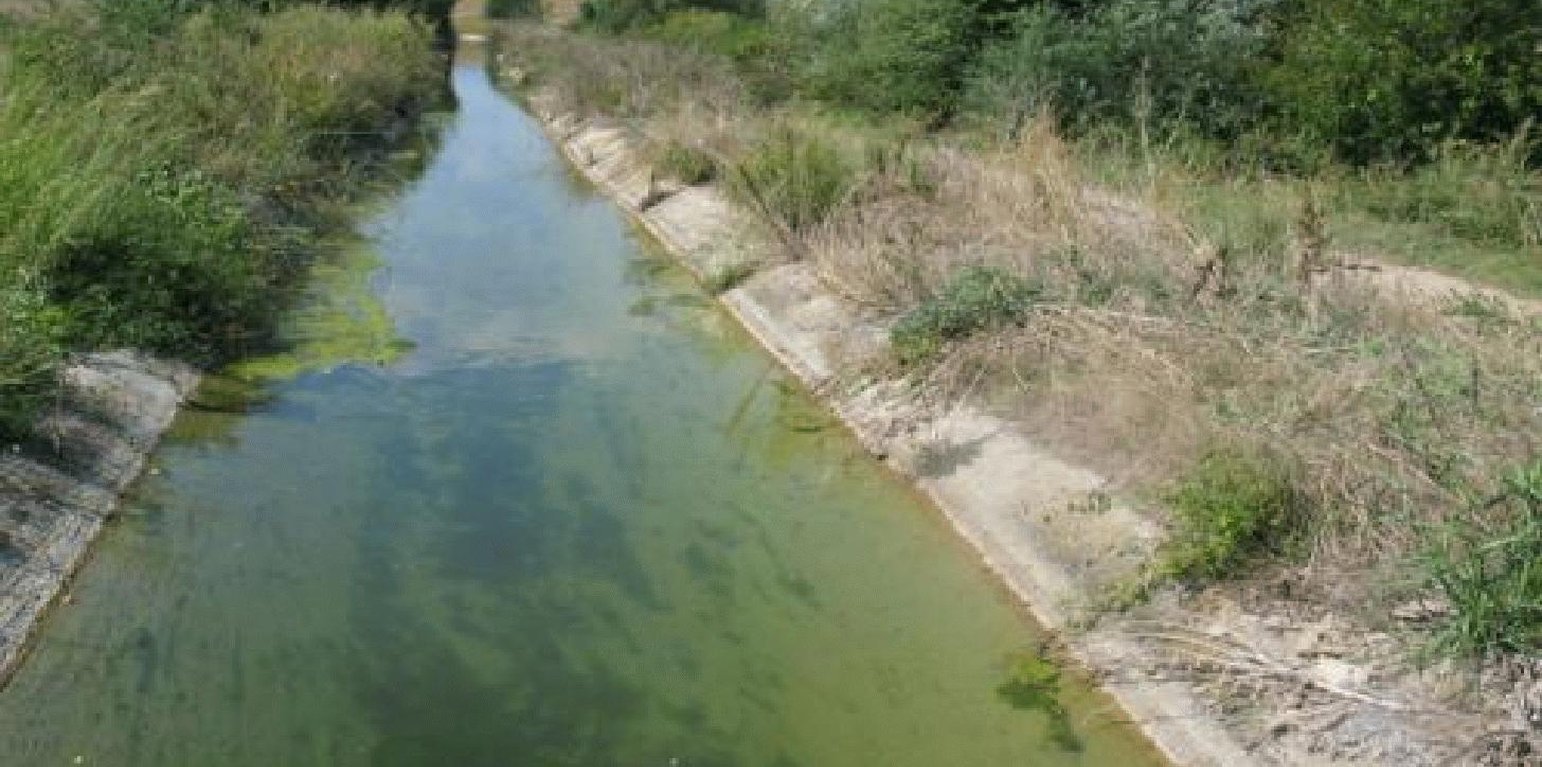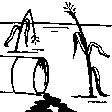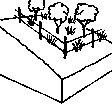Transport of freshwater from local streams
(ប្រទេសក្រិក)
Μεταφορά γλυκού από γειτονικά αρδευτικά κανάλια
ការពណ៌នា
Freshwater transport from local streams for irrigation purposes, in order to replace the traditional form of irrigation (by pumping saline groundwater from wells).
In low-lying regions suffering from overuse of the ground water for irrigation and seawater intrusion, pumping groundwater is detrimental and results in soil degradation (salinization) and reduced plant growth.
Purpose of the Technology: For this reason, freshwater is transported over distances of up to 500 m (or more) from surface streams, for irrigation using water of better quality. In this way, overexploitation of the aquifer is being reduced.
Establishment / maintenance activities and inputs: The pumps transfer water from canals or streams for irrigation purposes. A pumping station (10HP), pipes (PP-R, Ø 1100mm) for water transport and diesel or electricity for pump operation are the major items needed to replace groundwater with freshwater irrigation. However, annual maintenance of the pump and network is necessary.
Natural / human environment: The majority of families living in the research area make their living mostly from agricultural activities but also from livestock. Croplands are dominantly irrigated by wells (groundwater) and only those which are close to streams are irrigated with freshwater. Owing to over-pumping of the aquifer in order to irrigate the crop fields, there has been seawater intrusion over the past years. As a result, irrigation with groundwater led to saline soils. The group affected by this process comprises farmers who are now beginning to understand the extent of the desertification problem in the area. The degradation process significantly affects the quality of life of the local people. Saline soils lead to low productivity and thus to lower incomes (causing poverty) and thus an increase in social unrest. Although the farmers are totally aware of the on-going degradation problem that affects their fields and their livelihoods, they seem to be unwilling to change the way they irrigate their fields (with groundwater) as long as they do not have an alternative source of irrigation such as freshwater from local streams. The lack of information about how the salt-affected fields can be restored also makes the farmers believe that this situation is permanent and will extend over a wider area.
ទីតាំង
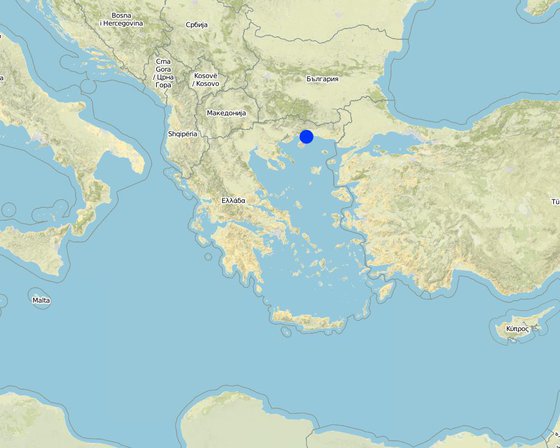
ទីតាំង: Eastern Macedonia and Thrace, Prefecture of Xanthi, ប្រទេសក្រិក
ចំនួនទីកន្លែងបច្ចេកទេស ដែលវិភាគ:
ចំណុចយោងភូមិសាស្ត្រនៃទីតាំងជ្រើសរើស
ការសាយភាយនៃបច្ចេកទេស:
តើស្ថិតក្នុងតំបន់ការពារអចិន្ត្រៃយ៍?:
កាលបរិច្ឆេទនៃការអនុវត្ត: តិចជាង 10ឆ្នាំមុន (ថ្មី)
ប្រភេទនៃការណែនាំឱ្យអនុវត្តន៍៖
-
តាមរយៈការបង្កើតថ្មីរបស់អ្នកប្រើប្រាស់ដី
-
ជាផ្នែកនៃប្រព័ន្ធប្រពៃណី (> 50 ឆ្នាំ)
-
ពេលកំពុងពិសោធន៍
-
តាមរយៈគម្រោង / អន្តរាគមន៍ពីខាងក្រៅ
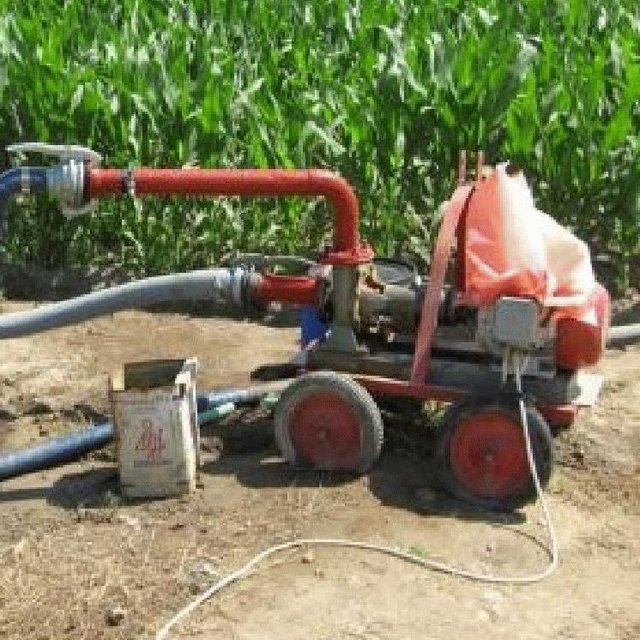
Electric water pump that provides irrigation water directly from canal (Alexandros Pechtelidis)
គោលបំណងចម្បងៗ
-
ធ្វើឱ្យប្រសើរឡើងនូវផលិតកម្ម
-
កាត់បន្ថយ, បង្ការ, ស្តារឡើងវិញនូវការធ្លាក់ចុះគុណភាពដី
-
អភិរក្សប្រព័ន្ធអេកូឡូស៊ី
-
ការពារតំបន់ទីជម្រាល/តំបន់ខ្សែទឹកខាងក្រោមបញ្ចូលជាមួយបច្ចេកទេសផ្សេងទៀត
-
អភិរក្ស/ធ្វើឱ្យប្រសើរឡើងជីវចម្រុះ
-
កាត់បន្ថយហានិភ័យនៃគ្រោះមហន្តរាយ
-
បន្ស៊ាំទៅនឹងការប្រែប្រួលអាកាសធាតុ/គ្រោះមហន្តរាយ និងផលប៉ះពាល់របស់វា
-
កាត់បន្ថយការប្រែប្រួលអាកាសធាតុ និងផលប៉ះពាល់របស់វា
-
បង្កើតផលប្រយោជន៍សេដ្ឋកិច្ច
-
បង្កើតផលប្រយោជន៍សង្គម
ការប្រើប្រាស់ដី
ដីប្រើប្រាស់ចម្រុះនៅលើដីតែមួយ បាទ/ចា៎ - កសិរុក្ខកម្ម
-
ដីដាំដំណាំ
- ដំណាំប្រចាំឆ្នាំ: ធញ្ញជាតិ - ពោត, ដំណាំសរសៃ - កម្បាស ឬសំឡី, ដំណាំចំណីសត្វ - ចន្ទល់ភ្នំ, wheat
- ប្រភេទដើមឈើធំៗ និងដើមឈើតូចៗ: អូលីវ
ចំនួនសារដែលដាំដំណាំក្នុងមួយឆ្នាំ: 1
ការផ្គត់ផ្គង់ទឹក
-
ទឹកភ្លៀង
-
ទឹកភ្លៀង និងប្រព័ន្ធស្រោចស្រព
-
ប្រព័ន្ធស្រោចស្រពទាំងស្រុង
គោលបំណងទាក់ទងនឹងការធ្លាក់ចុះគុណភាពដី
-
ការការពារការធ្លាក់ចុះគុណភាពដី
-
ការកាត់បន្ថយការធ្លាក់ចុះគុណភាពដី
-
ការជួសជុល/ ស្តារឡើងវិញនៃឱនភាពដីធ្ងន់ធ្ងរ
-
ការបន្ស៊ាំទៅនឹងការធ្លាក់ចុះគុណភាពដី
-
ដែលមិនអាចអនុវត្តបាន
ប្រភេទនៃការធ្លាក់ចុះគុណភាពដីដែលបានដោះស្រាយ
-
ការធ្លាក់ចុះសារធាតុគីមីក្នុងដី - Cs: សារធាតុប្រៃ/អាល់កាឡាំង
ក្រុម SLM
-
ការគ្រប់គ្រងប្រព័ន្ធស្រោចស្រព (រួមទាំងការផ្គត់ផ្គង់ទឹក ប្រព័ន្ធបង្ហូរ)
វិធានការ SLM
-
វិធានការគ្រប់គ្រង - M7: ផ្សេងៗ
គំនូរបច្ចេកទេស
លក្ខណៈបច្ចេកទេស
Scheme showing the SLM technology application
Location: Eastern Nestos Delta River Basin. Prefecture of Xanthi
Date: 14/03/2010
Technical knowledge required for field staff / advisors: high
Technical knowledge required for land users: moderate
Main technical functions: water spreading, replacing saline groundwater with surface freshwater, reduce pressure/overexploitation on aquifer
Secondary technical functions: improvement of surface structure (crusting, sealing), improvement of topsoil structure (compaction), improvement of subsoil structure (hardpan), increase of infiltration, increase of groundwater level / recharge of groundwater
Agronomic measure: soil desalinization
Material/ species: freshwater
Remarks: salinity leaching
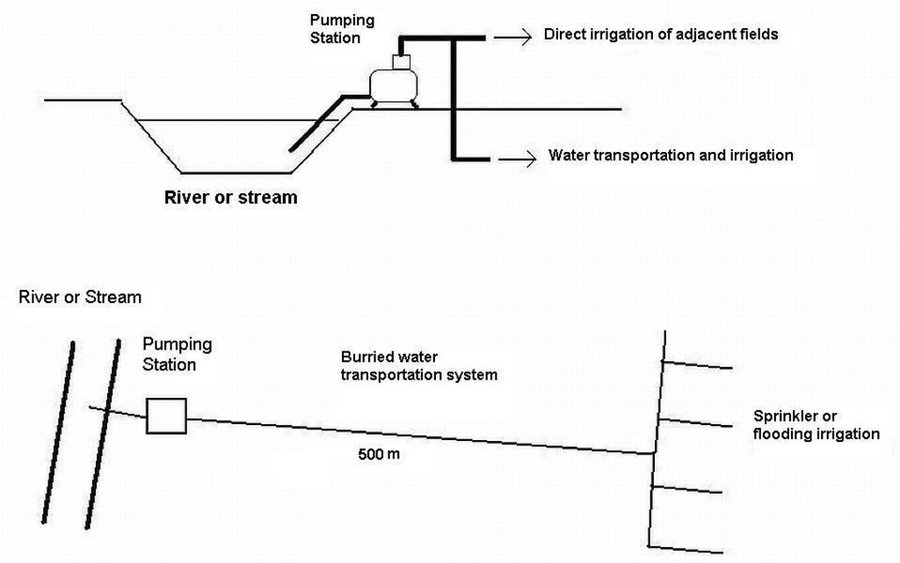
Author: Alexandros Pechtelidis, Vas. Sofias 12, Xanthi, Greece
ការបង្កើតនិងការថែទាំ៖ សកម្មភាព ធាតុចូល និងថ្លៃដើម
ការគណនាធាតុចូល និងថ្លៃដើម
- ថ្លៃដើមត្រូវបានគណនា៖
- រូបិយប័ណ្ណសម្រាប់ការគណនាថ្លៃដើម៖ euro
- អត្រាប្តូរប្រាក់ (ទៅជាដុល្លារអាមេរិក)៖ 1 USD = 0.7 euro
- ថ្លៃឈ្នួលជាមធ្យមក្នុង ១ ថ្ងៃ៖ មិនមាន
កត្តាសំខាន់បំផុតដែលមានឥទ្ធិពលលើថ្លៃដើម
Diesel or electricity price affects the final cost.
សកម្មភាពបង្កើតបច្ចេកទេស
-
construction of irrigation network (ពេលវេលា/ ភាពញឹកញាប់: None)
ធាតុចូល និងថ្លៃដើមសម្រាប់ការបង្កើតបច្ចេកទេស
| បញ្ជាក់ពីធាតុចូល |
ឯកតា |
បរិមាណ |
ថ្លៃដើមក្នុងមួយឯកតា (euro) |
ថ្លៃធាតុចូលសរុប (euro) |
% នៃថ្លៃដើមដែលចំណាយដោយអ្នកប្រើប្រាស់ដី |
|
កម្លាំងពលកម្ម
|
| Labour |
Irrigation network |
1,0 |
969,0 |
969,0 |
100,0 |
|
សម្ភារៈ
|
| hire of an ecavator |
Irrigation network |
1,0 |
1107,0 |
1107,0 |
100,0 |
| Pumping station |
Irrigation network |
1,0 |
3460,0 |
3460,0 |
100,0 |
|
សម្ភារៈសាងសង់
|
| Water transport pipes |
Irrigation network |
1,0 |
|
|
100,0 |
|
ផ្សេងៗ
|
| Diesel fuel (1 Lt) |
Liter |
1,0 |
1,4 |
1,4 |
100,0 |
| Electricity (1 Kw) |
Liter |
1,0 |
0,4 |
0,4 |
100,0 |
| ថ្លៃដើមសរុបក្នុងការបង្កើតបច្ចេកទេស |
5'537.8 |
|
| ថ្លៃដើមសរុបក្នុងការបង្កើតបច្ចេកទេសគិតជាដុល្លារ |
7'911.14 |
|
សកម្មភាពថែទាំ
-
Network maintenance (ពេលវេលា/ ភាពញឹកញាប់: annualy)
ធាតុចូលនិងថ្លៃដើមសម្រាប់ការថែទាំ
| បញ្ជាក់ពីធាតុចូល |
ឯកតា |
បរិមាណ |
ថ្លៃដើមក្នុងមួយឯកតា (euro) |
ថ្លៃធាតុចូលសរុប (euro) |
% នៃថ្លៃដើមដែលចំណាយដោយអ្នកប្រើប្រាស់ដី |
|
កម្លាំងពលកម្ម
|
| Labour |
Irrigation network |
1,0 |
138,0 |
138,0 |
100,0 |
|
សម្ភារៈ
|
| Hire of an ecavator |
Irrigation network |
1,0 |
275,0 |
275,0 |
100,0 |
| Pumpiong station |
Irrigation network |
1,0 |
200,0 |
200,0 |
100,0 |
|
ផ្សេងៗ
|
| diesl fuel or erlectricity |
Irrigation network |
1,0 |
1512,0 |
1512,0 |
100,0 |
| ថ្លៃដើមសរុបសម្រាប់ការថែទាំដំណាំតាមបច្ចេកទេស |
2'125.0 |
|
| ថ្លៃដើមសរុបសម្រាប់ការថែទាំដំណាំតាមបច្ចេកទេសគិតជាដុល្លារ |
3'035.71 |
|
បរិស្ថានធម្មជាតិ
បរិមាណទឹកភ្លៀងជាមធ្យមប្រចាំឆ្នាំ
-
< 250 មម
-
251-500 មម
-
501-750 មម
-
751-1,000 មម
-
1,001-1,500 មម
-
1,501-2,000 មម
-
2,001-3,000 មម
-
3,001-4,000 មម
-
> 4,000 មម
តំបន់កសិអាកាសធាតុ
-
សើម
-
មានភ្លៀងមធ្យម
-
មានភ្លៀងតិចតួច
-
ស្ងួត
លក្ខណៈសម្គាល់នៃអាកាសធាតុ
Thermal climate class: temperate. Mediterranean type climatic conditions
ជម្រាល
-
រាបស្មើ (0-2%)
-
ជម្រាលតិចតួច (3-5%)
-
មធ្យម (6-10%)
-
ជម្រាលខ្ពស់បន្តិច (11-15%)
-
ទីទួល (16-30%)
-
ទីទួលចោត (31-60%)
-
ទីទួលចោតខ្លាំង (>60%)
ទម្រង់ដី
-
ខ្ពង់រាប
-
កំពូលភ្នំ
-
ជម្រាលភ្នំ
-
ជម្រាលទួល
-
ជម្រាលជើងភ្នំ
-
បាតជ្រលងភ្នំ
រយៈកម្ពស់ធៀបនឹងនីវ៉ូទឹកសមុទ្រ
-
0-100 ម
-
101-500 ម
-
501-1,000 ម
-
1,001-1,500 ម
-
1,501-2,000 ម
-
2,001-2,500 ម
-
2,501-3,000 ម
-
3,001-4,000 ម
-
> 4,000 ម
បច្ចេកទេសត្រូវបានអនុវត្តនៅក្នុង
-
សណ្ឋានដីប៉ោង
-
សណ្ឋានដីផត
-
មិនពាក់ព័ន្ធទាំងអស់
ជម្រៅដី
-
រាក់ខ្លាំង (0-20 សម)
-
រាក់ (21-50 សម)
-
មធ្យម (51-80 សម)
-
ជ្រៅ (81-120 សម)
-
ជ្រៅខ្លាំង (> 120 សម)
វាយនៈភាពដី (ដីស្រទាប់ខាងលើ)
-
គ្រើម/ មានពន្លឺ (ខ្សាច់)
-
មធ្យម (ល្បាយ, ល្បាប់)
-
ម៉ត់/ ធ្ងន់ (ឥដ្ឋ)
វាយនភាពដី (> 20 សម ក្រោមស្រទាប់លើ)
-
គ្រើម/ មានពន្លឺ (ខ្សាច់)
-
មធ្យម (ល្បាយ, ល្បាប់)
-
ម៉ត់/ ធ្ងន់ (ឥដ្ឋ)
កម្រិតសារធាតុសរីរាង្គក្នុងដីស្រទាប់លើ
-
ខ្ពស់ (>3%)
-
មធ្យម (1-3%)
-
ទាប (<1%)
ដង្ហើមទឹកក្នុងដី
-
ផ្ទៃខាងលើ
-
< 5 ម
-
5-50 ម
-
> 50 ម
ភាពអាចរកបាននៃទឹកលើដី
-
លើស
-
ល្អ
-
កម្រិតមធ្យម
-
មិនមាន/ គ្មាន
គុណភាពទឹក (មិនបានធ្វើប្រព្រឹត្តិកម្ម)
-
ទឹកពិសារដែលមានគុណភាពល្អ
-
ទឹកពិសារដែលគ្មានគុណភាព (តម្រូវឱ្យមានការសំអាត)
-
ទឹកសម្រាប់តែការធ្វើកសិកម្ម (ស្រោចស្រព)
-
ទឹកមិនអាចប្រើប្រាស់បាន
គុណភាពទឹក គឺផ្តោតទៅលើ៖
តើមានបញ្ហាទឹកប្រៃហូរចូលដែរឬទេ?
ការកើតឡើងនៃទឹកជំនន់
ភាពសំបូរបែបនៃជម្រកធម្មជាតិ
ចរិតលក្ខណៈរបស់អ្នកប្រើប្រាស់ដីដែលប្រើបច្ចេកទេស SLM
ទីផ្សារ
-
សម្រាប់ហូបក្នុងគ្រួសារ (ផ្គត់ផ្គង់ខ្លួនឯង)
-
ពាក់កណ្តាលពាណិជ្ជកម្ម (ផ្គត់ផ្គង់ខ្លួនឯង/ ពាណិជ្ជកម្ម)
-
ពាណិជ្ជកម្ម/ ទីផ្សារ
ចំណូលក្រៅកសិដ្ឋាន
-
តិចជាង 10% នៃចំណូល
-
10-50% នៃចំណូល
-
ច្រើនជាង 50% នៃចំណូល
កម្រិតជីវភាព
-
មិនល្អខ្លាំង
-
មិនល្អ
-
មធ្យម
-
មាន
-
មានខ្លាំង
កម្រិតនៃការប្រើគ្រឿងយន្ត
-
ប្រើកម្លាំងពលកម្ម
-
ប្រើកម្លាំងសត្វ
-
គ្រឿងយន្ត/ ម៉ាស៊ីន
នៅមួយកន្លែង ឬពនេចរ
-
នៅមួយកន្លែង
-
ពាក់កណ្តាលពនេចរ
-
ពនេចរ
បុគ្គល ឬក្រុម
-
ធ្វើខ្លួនឯង/ គ្រួសារ
-
ជាក្រុម/ សហគមន៍
-
សហករ
-
មានបុគ្គលិក (ក្រុមហ៊ុន, រដ្ឋ)
អាយុ
-
កុមារ
-
យុវវ័យ
-
វ័យកណ្តាល
-
មនុស្សចាស់
ផ្ទៃដីប្រើប្រាស់ក្នុងមួយគ្រួសារ
-
< 0.5 ហិកតា
-
0.5-1 ហិកតា
-
1-2 ហិកតា
-
2-5 ហិកតា
-
5-15 ហិកតា
-
15-50 ហិកតា
-
50-100 ហិកតា
-
100-500 ហិកតា
-
500-1,000 ហិកតា
-
1,000-10,000 ហិកតា
-
> 10,000 ហិកតា
មាត្រដ្ឋាន
-
ខ្នាតតូច
-
ខ្នាតមធ្យម
-
ខ្នាតធំ
ភាពជាម្ចាស់ដីធ្លី
-
រដ្ឋ
-
ក្រុមហ៊ុន
-
ភូមិ
-
ក្រុម
-
ឯកជន មិនមានកម្មសិទ្ធ
-
ឯកជន មានកម្មសិទ្ធ
សិទ្ធិប្រើប្រាស់ដី
-
អាស្រ័យផលសេរី (មិនមានការកំណត់)
-
ជាក្រុម (មានដែនកំណត់)
-
កិច្ចសន្យាជួល
-
ឯកជន
សិទ្ធិប្រើប្រាស់ទឹក
-
អាស្រ័យផលសេរី (មិនមានការកំណត់)
-
ជាក្រុម (មានដែនកំណត់)
-
កិច្ចសន្យាជួល
-
ឯកជន
ប្រើប្រាស់សេវាកម្ម និងហេដ្ឋារចនាសម្ព័ន្ធ
ការងារ (ឧ. ការងារក្រៅកសិដ្ឋាន)
ផលប៉ះពាល់
ផលប៉ះពាល់សេដ្ឋកិច្ចសង្គម
ផលិតកម្មដំណាំ
គុណភាពមុន SLM: 3.4t/ha
គុណភាពក្រោយ SLM: 4.2t/ha
Increased, but: Sodic soils may first require gypsoum application
ហានិភ័យនៃភាពបរាជ័យរបស់ផលិតកម្ម
ទឹកប្រើប្រាស់សម្រាប់ស្រោចស្រព
Due to increased demand for freshwater
គុណភាពទឹកស្រោចស្រព
Due to increased demand for freshwater
តម្រូវការទឹកសម្រាប់ស្រោចស្រព
Freshwater for irrigation from streams/river
ការចំណាយលើធាតុចូលកសិកម្ម
Requires funding for implementation
ផលប៉ះពាល់វប្បធម៌សង្គម
ចំណេះដឹង SLM / ការធ្លាក់ចុះគុណភាពដី
Improved livelihoods and human well-being
Income increase and thus well-being.
ផលប៉ះពាល់លើអេកូឡូស៊ី
នីវ៉ូទឹកក្រោមដី/ ដង្ហើមទឹក
ផលប៉ះពាល់ក្នុងបរិវេណ
លំហូរទឹកថេរនិងទៀតទាត់នៅរដូវប្រាំង (រាប់ទាំងលំហូរតិចៗ)
ទឹកជំនន់ខ្សែទឹកខាងក្រោម (មិនត្រូវការ)
Due to water abstraction from streams/river for irrigation
ទឹកក្រោមដី/ ការបំពុលទឹកទន្លេ
Due to reduced groundwater exploitation
ការវិភាគថ្លៃដើម និងអត្ថប្រយោជន៍
អត្ថប្រយោជន៍បើប្រៀបធៀបនឹងថ្លៃដើមក្នុងការបង្កើតបច្ចេកទេស
រយៈពេលខ្លី
អវិជ្ជមានខ្លាំង
វិជ្ជមានខ្លាំង
រយៈពេលវែង
អវិជ្ជមានខ្លាំង
វិជ្ជមានខ្លាំង
អត្ថប្រយោជន៍បើប្រៀបធៀបនឹងថ្លៃដើមក្នុងការថែទាំបច្ចេកទេស
រយៈពេលខ្លី
អវិជ្ជមានខ្លាំង
វិជ្ជមានខ្លាំង
រយៈពេលវែង
អវិជ្ជមានខ្លាំង
វិជ្ជមានខ្លាំង
ការប្រែប្រួលអាកាសធាតុ
ការប្រែប្រួលអាកាសធាតុ
សីតុណ្ហភាពប្រចាំឆ្នាំ កើនឡើង
គ្រោះអាកាសធាតុ (មហន្តរាយ)
ផលវិបាកដែលទាក់ទងនឹងបរិយាកាសផ្សេងៗទៀត
ការទទួលយក និងការបន្ស៊ាំ
ភាគរយនៃអ្នកប្រើប្រាស់ដីនៅតំបន់ដែលបានទទួលយកបច្ចេកទេស
-
តែមួយករណី /ពិសោធន៍
-
1-10%
-
11-50%
-
> 50%
ក្នុងចំណោមអ្នកទទួលយកបច្ចេកទេសនេះ តើមានប៉ុន្មានភាគរយដែលបានអនុវត្តន៍ដោយមិនបានទទួលការលើកទឹកចិត្តជាសម្ភារៈ?
-
0-10%
-
11-50%
-
51-90%
-
91-100%
ចំនួនខ្នងផ្ទះ និង/ឬតំបន់ដែលគ្របដណ្តប់
50
តើថ្មីៗនេះ បច្ចេកទេសនេះត្រូវបានកែតម្រូវដើម្បីបន្ស៊ាំទៅនឹងស្ថានភាពប្រែប្រួលដែរឬទេ?
ចំពោះលក្ខខណ្ឌប្រែប្រួលណាមួយដែលត្រូវបានបន្ស៊ាំ?
-
ការប្រែប្រួលអាកាសធាតុ/គ្រោះមហន្តរាយធម្មជាតិ
-
បម្រែបម្រួលទីផ្សារ
-
កម្លាំងពលកម្មដែលអាចរកបាន (ចំណាកស្រុក)
សេក្តីសន្និដ្ឋាន និងមេរៀនបទពិសោធន៍
ភាពខ្លាំង: ទស្សនៈអ្នកប្រើប្រាស់ដី
-
Better yield
How can they be sustained / enhanced? Application of fertilizers
-
More income due to improved crop quality
How can they be sustained / enhanced? Selection of crop type
-
Better future perspective for the area
How can they be sustained / enhanced? Financial motives
ភាពខ្លាំង: ទស្សនៈរបស់អ្នកចងក្រង ឬបុគ្គលសំខាន់ផ្សេងទៀត
-
Increased irrigation water quality which result in better soil quality
How can they be sustained / enhanced? Construction of more irrigation canals
-
Remediation of soils
How can they be sustained / enhanced? Better drainage systems
-
Groundwater recharge
How can they be sustained / enhanced? Construction of more irrigation canals
-
Improved quality/quantity of yield
How can they be sustained / enhanced? Selection of the most suitable crop type
-
Improved livelihood of the locals
How can they be sustained / enhanced? Better local products promotion
ចំណុចខ្សោយ/ គុណវិបត្តិ/ ហានិភ័យ : ទស្សនៈអ្នកប្រើប្រាស់ដីវិធីដោះស្រាយ
-
Bureaucratic problems
Promotion of fast track financial programs
ចំណុចខ្សោយ/ គុណវិបត្តិ/ ហានិភ័យ : ទស្សនៈរបស់អ្នកចងក្រង ឬបុគ្គលសំខាន់ផ្សេងទៀតវិធីដោះស្រាយ
-
Installation cost
Financial aid from government/EU
-
Applicable only for fields adjacent or very close to a fresh water source
Construction of canals
ឯកសារយោង
អ្នកត្រួតពិនិត្យ
-
Deborah Niggli
-
Alexandra Gavilano
កាលបរិច្ឆេទនៃការអនុវត្ត: 11 ខែ ឧសភា ឆ្នាំ 2011
កែតម្រូវចុងក្រោយ: 2 ខែ មេសា ឆ្នាំ 2019
បុគ្គលសំខាន់ៗ
-
John Gkiougkis - អ្នកជំនាញឯកទេស SLM
-
Alexandros Pechtelidis - អ្នកជំនាញឯកទេស SLM
ការពណ៌នាលម្អិតក្នុងប្រព័ន្ធគ្រប់គ្រងទិន្នន័យរបស់វ៉ូខេត
ឯកសារនេះត្រូវបានសម្របសម្រួលដោយ
ស្ថាប័ន៖
- Democritus University of Thrace (Democritus University of Thrace) - ប្រទេសក្រិក
គម្រោង
ឯកសារយោងសំខាន់ៗ
-
Gkiougkis I. et. al. (2010) Proceedings of the 12th International Congress, Geological Society of Greece, Patras, May, 2010:
